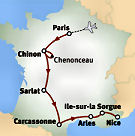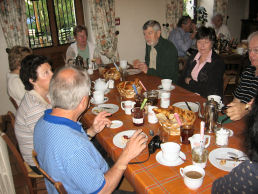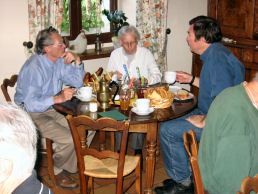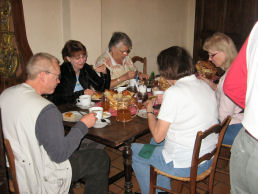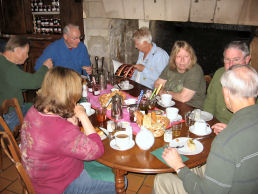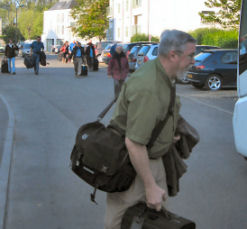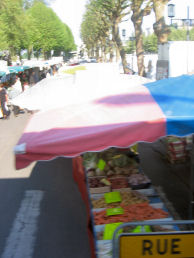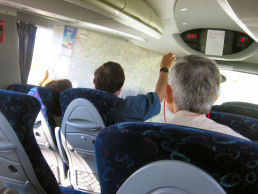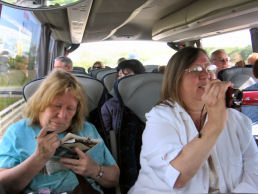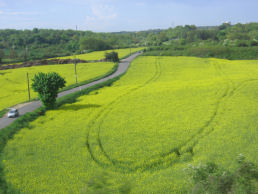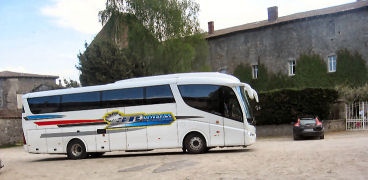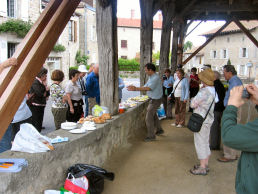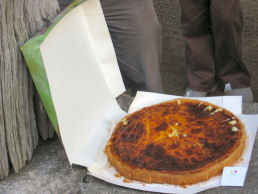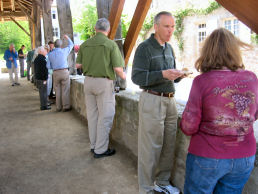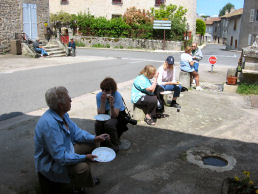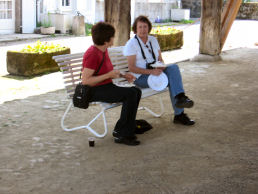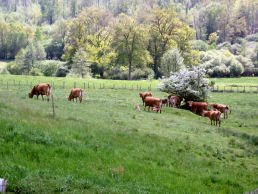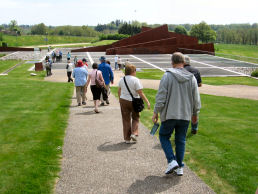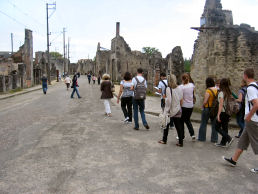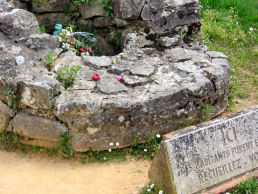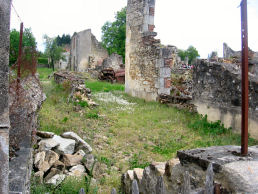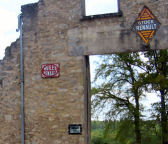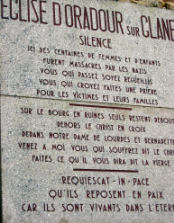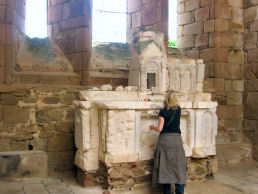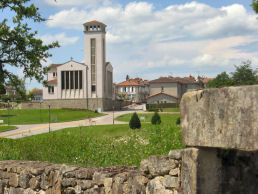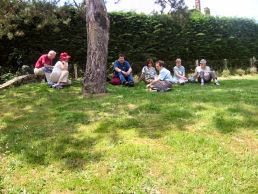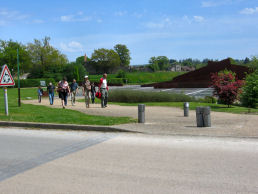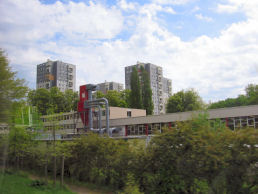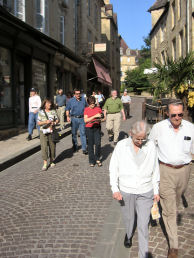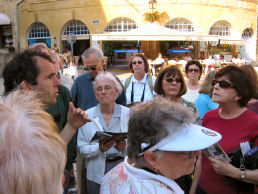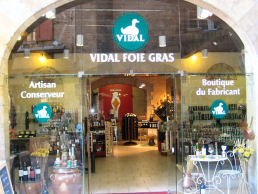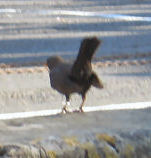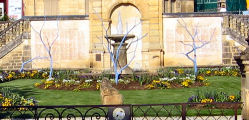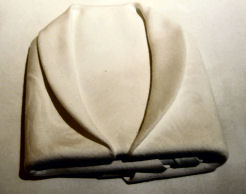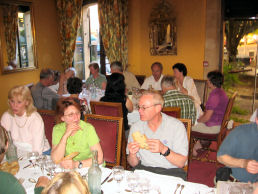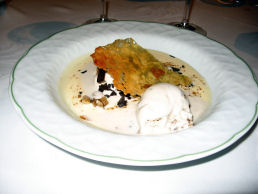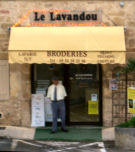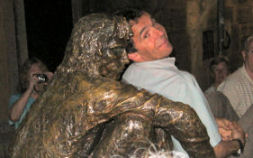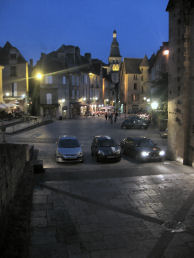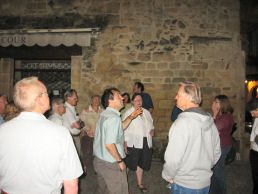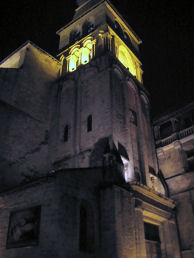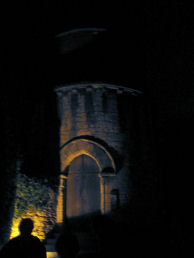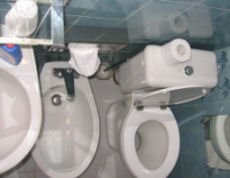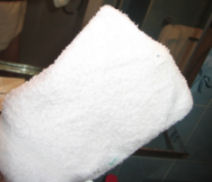I woke up at 5:30 when Sue looked at her watch. I felt much better than I had the previous morning, and this was a great relief. Getting sick on an expensive trip like this was not on my to-do list.
I checked ESPN’s website on the Internet; the Red Sox had won. The Corcorans would be happy. I then looked up the date of the canonization of Joan of Arc. Patrick was right about it not occurring until the 20th century. Pope Benedict XV made it official in 1920 in order to persuade the French government to reestablish relations with the Vatican. His scheme worked.
Sue stayed in bathroom for ages. Whoops. I noticed a small hole in the right armpit of my Appalachian Trail tee shirt. I would have to demote it to sleeping shirt.The forecast for the day was 74 and sunny. I decided to wear my nylon pants over my shorts with the orange polo shirt, which was finally almost dry. The now-functioning dryer made short work of the last bit of moisture.
I went down to breakfast by myself, where I learned that Tom Liddle had been a patent lawyer and that Mike Birdlebough ran a winery. I tried to interest Tom in my billion dollar scheme to wrest the delivery of inserts from the newspapers. He made a lot of positive noises, but he did not write me a check.
I asked Laurent about the fowl atop the memorial across the street from the square. He said that the cock was the symbol of Aragon, hence of France. I was unfamiliar with such a close relationship between Aragon and France.[1]
Sue and I packed everything up, and this time the process was amicable. She took her stuff down with her to breakfast. She was adamant that she was not going to climb the stairs twice. She entrusted me with making sure that we did not leave anything in the room.[2] Half of the group went the wrong way to bus. They went down to Place Jeanne d’Arc. Olivier had actually pulled onto a side street so that we would have a slightly shorter walk. The laggards were thus rewarded.Patrick asked us to select our choices for the supper on the next Monday: For starters we had to choose between beef and vegetables and some kind of eggplant dish. For the main course we could have shrimp and scallops on a skewer, duck, or lamb. The dessert was chocolate, French toast (?), or sorbet. I selected eggplant, the skewer, and sorbet. Patrick informed us that no one in France would know what you were talking about if you asked for French toast or French fries.
There did not seem to be much traffic on the A10. There certainly were lots of railroad tracks. It must be nice to live in a country in which you can dependably get from one place to another by rail. I brought my u-shaped blue neck pillow with me onto the bus. It was sort of bulky to carry around, but it made the bus rides more comfortable. I had tried the air-filled ones. There was no comparison.We stopped at an Autogrill for our bathroom break. I assumed that they were run by the same company that runs the ones in Italy. Kat had told us six years ago that they were owned by Bennetton, the clothing company.[3] This place could not match La Boutique for coffee machines. The Autogrill only had seven.
We passed a theme park called Futuroscope. I tried to take a photo of it from the highway, which was as close as we got. Patrick and Olivier were deaf to our cries of “Can we go, daddy? Can we go?”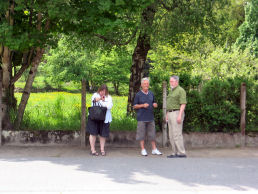
We exited from the A10 in favor of a secondary road.
Patrick sketched an outline of the French educational system. École maternelle was for youngsters from two and a half to six years old. The youngest students only went in the mornings. Older ones attended from 9-5 with a long lunch at an inexpensive (1.5-5€) school restaurant. For some reason there was no school on Wednesday. After that they attended primary school. The term “college” was used for schools for kids who would go to junior high in the U.S. The lycée was the equivalent of our high school. Universities supplied education past that level. Until recently French students had attended class on Saturday mornings, but President Sarkozy put an end to this practice by fiat. I got the distinct impression that Patrick was not enamored of the current French government. I did not realize it, but students had been on strike for months at French universities. If the strike continued much longer, the universities would not be able to conduct their exams.[4]We came upon a roundabout with no intersecting road.
Patrick explained the French medical system, which he thought was pretty good. 70 percent of expenses were covered by the government. Insurance was available for the last 30 percent. He said that he carried insurance for his wife, but not for himself. He said that the French system was always rated very high. He told the story about a French hospital that “lost” the paperwork for an American whom they had treated so that he would not have to deal with our horrendous system. Somehow I doubt that our hospitals would return the favor in similar circumstances.
A few drops of rain fell. Olivier never bothered to put on the wipers.Patrick then discussed the French government and electoral system. The president was elected for five years. Because there were so many parties, there were always two rounds of elections. The second one was a runoff between the two highest vote-getters in the first election. The national assembly was chosen at same time elect prime minister. Because the elections were simultaneous, the prime minister was almost always from the same party as the president. According to Patrick there was little oversight of the president. Sarkozy could essentially do whatever he wanted.
Patrick said that the French and other European nations had been dealing with terrorism for a long time. The see-through rubbish bags that were evident in Paris were implemented because of the threat of terrorist bombs. No one can park in front of schools. 14 percent of the French people are Muslim. The problem that they faced was the integration of the various peoples. We learned that most people on the island of Corsica wanted independence from France. It was doubtful that most people on the French mainland had thought enough about the subject to form a coherent opinion.As our bus approached Limoges, Patrick let us know that the English word limousine comes from Limoges, which at one time had a reputation as the home of good carriage-makers. The surrounding region of France was called Limousin. The Limousin cows were red.
Our destination for the afternoon was Oradour-sur-Glane. We stopped for lunch first at a sleepy town named Mortemart. The rest of us milled around for quite a few minutes while Patrick and a few volunteers obtained the fixings for our picnic. At one point Olivier had to move the bus because it was parked in front of one of the few buildings that seemed to have any activity. A car pulled up, and the occupants inquired if we spoke English. Then the driver asked us for directions. I did not know how to get anywhere from where we were, but Tom Corcoran seemed to be able to help them. I did not overhear the exchange, but I suspected that they might have been looking for Oradour-sur-Glane. The lunch consisted of bread, salad, couscous, something with honey, shaved carrots, some meat, and a pâté. There were also two kinds of cow cheese and two types of goat cheese. Wine and water were offered as beverages. There was some flan for dessert. I had both red and white wine. The food was quite good, and the occasion gave us an opportunity for a little socializing. However, the location was less than ideal. We had to wait a long time before the food was ready, and there was nothing much to do. Furthermore, there were no tables, and even finding a place to sit and eat was difficult. Food had to be balanced on laps, and conversation was at a minimum because the group spread out so much to find stumps or concrete blocks on which to sit. The small town of Oradour-sur-Glane was the location of a mysterious Nazi massacre on June 10, 1944. The Nazi soldiers killed 642 men. Five men, two children, and one woman managed to escape. The town was riddled with bullets, and most of the buildings were burned to the ground. The motivation for the massacre was still disputed. The ruins had been preserved so that no one would forget how cruel people can be to one another, and we were allowed to walk through them for a few hours. I found the experience interesting, but I would not want to do it again. Having been to Auschwitz two years earlier, I did not need this lesson. Moreover, as massacres – even French massacres – go, the one at Oradour did not rank among the worst. I was one of the first people from the group to leave the village. I found a nice spot to seat myself on the grass in the sunlight where I enjoyed watching the behavior of the groups of French students for whom the pilgrimage to Oradour is de rigueur. I also got some good pictures of Limousin cows. Patrick disclosed the epilog. In January of 1953 twenty-one of the sixty-five soldiers involved in the massacre were put on trial. Two of them were sentenced to death, but political problems arose because the condemned soldiers came not from Germany but from Alsace. They claimed to have been drafted into the SS against their will. The French parliament subsequently granted them amnesty, a decision that was decidedly not popular in Limousin. We pulled into another truck stop for a break. Tom Stan tried to give away his cookies to other members of the group. Patti and I saved Nancy and Barbara Postles from an imminent purchase of chicken-flavored potato chips. Back on the bus Patrick conducted another French lesson. This time we concentrated on the numbers. French, at least as it is spoken in France itself, has a very peculiar way of expressing the numbers divisible by ten. Seventy is said as sixty and ten (soixante-dix). Eighty is said as four twenties (quatre-vingt). Ninety is said as four twenties and ten (quatre-vingt-dix). Patrick said that in Belgium they use separate words for all three. The Swiss agree with the Belgians about seventy and ninety, but they side with the French for eighty. I found it hard to believe that Napoleon, who standardized everything else, put up with this. Our destination for the next three days or so would be the area around the Dordogne River. During the period of the Hundred Years War, the river served as the border between England and France. The region was often called the Périgord. The Périgord had become a popular tourist destination. Patrick said that there was still a very pervasive British influence. The wine in this region was said to be stronger than that of Chinon. Patirick singled out Pécharmant as a strong red wine with a pleasant taste. Donald, Daisy, and Daffy should stay away from the Périgord. The people here loved to eat duck and geese. They also served the quackers and honkers to the tourists in many configurations. The most popular was confit, in which the duck was preserved in its own fat. Patrick explained the production of foie gras. The ducks and geese were force-fed and then slaughtered for their livers. As grotesque as this sounded, it was certainly no worse than the practices in the gigantic chicken farms in the States. Patrick emphasizedd that at least the ducks and geese were treated well.This region was also famous for its walnuts and the wild mushrooms that were available in the fall. Truffles were hunted using pigs and dogs.
Patrick announced that we were scheduled to eat two dinners together at our hotel in Sarlat-la-Canéda. Thursday’s fare would be salad with breast of duck (magret du canard) and asparagus as the starter, dorade (Black Sea breen) with green bean pâté, and walnut ice cream as the dessert.
Friday’s menu called for something with wild mushroom sauce, confit canard with sliced potatoes, and chocolate cake.I noticed that the French police often wore light blue polo shirts. This would never do in Italy. Each type of police that we had encountered there had its own distinctive uniform, and they were all very snazzy.
We drove into Sarlat, which was evidently quite a bit larger than Chinon. Our hotel, La Couleuvrine,[5] was on the northeastern edge of the old town.
Our room was very small. The bathroom had a bidet, but the shower was ridiculous. In fact, I asked Sue to notify me when she was about to take a shower. I wanted to film her attempt to get through the rickety and very narrow shower door. The first time that I took a shower I was able to get the nozzle holder adjusted up on the vertical rail, but I could not get it to stay in one place. Even among pitiful European showers this one ranked low.
The hotel had placed a card in the room that indicated that Internet access was available through the phone. I asked at the desk for an Ethernet cable. They provided one, but I was not able to get the connection to work. The problem could have been in the phone, the cable, or the computer’s Ethernet card. Since I had never tested the netbook’s Ethernet port, I was reluctant to press on this front.Fortunately, I was able to leech off of someone’s unprotected wireless network. The signal was very weak; the only way I could use it reliably was to place the computer on the windowsill. I might need to try the free wi-fi spot at a bar around the corner.
Sue decided to do some laundry. As I inspected my clothes I discovered that I had left my blue shirt and brown pants in the armoire in Chinon. I did not consider this a catastrophe. I probably did not need the pants, and I could just buy a shirt in Sarlat. The pants were new, but I did not like them very much. The shirt was at least four years old, but it was one of my favorites. It was also the closest thing that I had to something dressy.We ate supper at the hotel’s restaurant. At our table were Patti and Tom, Nancy, Jim, both Barbaras, and Olivier and Patrick. Jim tried to buy Olivier a glass of wine, but he was evidently not allowed to drink alcohol while he was working.[6] Tom ordered the wine for the four of us.
At one point Sue went back to the Laundromat to put the clothes in the dryer. While she was out, Nancy told us that her guide for the Germany-Austria-Switzerland tour was Susana Minich. I chipped in with the story of how Susana had somehow retrieved my backpack from a locked classroom in Recsk, Hungary. Nancy also related that she had read on the web that one of Patrick’s previous tours did not did not include the interview and introduction of buddies. Someone had complained about it. I learned that Nancy and Barbara had visited Lake Bled on the Croatia-Slovenia tour.Patrick originally asked them to serve me Brad's vegetarian salad. Evidently people had been getting Brad and me mixed up. I just could not understand this; he had grey hair and looked old.
The food was very good, particularly the duck in the salad and the ice cream, of which I am ordinarily not a great fan.After supper, Patrick took us on a little tour of part of Sarlat by night. He pointed out a bunch of architectural stuff that did not interest me too much. It has always struck me as somewhat strange that all the masons seemed to change their styles just as a new century began.
I was more interested in the stories of the cathedral of St. Sacerdos, which formerly housed a group of monks. On the wall on one side of the cathedral grounds were niches called enfeus. They were used to present the bodies of the deceased monks for respectful veneration before they were interred. Patrick led us on a rather spooky walk through the inky shadows of the monks' cemetery until we reached a mysterious asparagus-shaped building dedicated to St. Bernard of Clairvaux. It was commonly called the Lantern of the Dead because of a high window in an unreachable room.
I fell asleep within seconds of hitting the pillow. Since Sue was still rooting around in the room, I wore my eye-mask.
[1] I later found references on the Internet to the cock being a symbol of France and Wallonia, the French-speaking part of Belgium.
[2] The resulting mishap was therefore obviously completely Sue’s fault. If she insisted on shirking her responsibility, she should have at least found someone more reliable than me to check out the room.
[3] Evidently Bennetton still owns a controlling interest, and the stores were in forty countries.
[4] The strike was suspended on May 20, 2009.
[5] The name refers to a long cannon. Several of them were affixed to the town wall, of which the hotel was situated at an important corner.
[6] This seemed a little strange. I am pretty sure that Bojan had had a beer when he sat next to me at lunch in Levoča. Mario surely must have had a glass of wine or two at our meals together. I remember seeing Peter at the bar in Vernazza, and I vividly remember him as loving beer. Maybe the rules were set by the bus companies.
